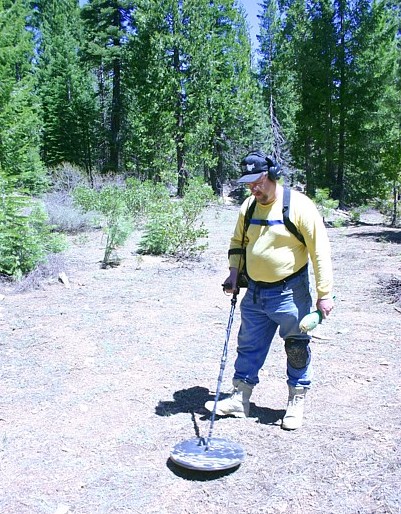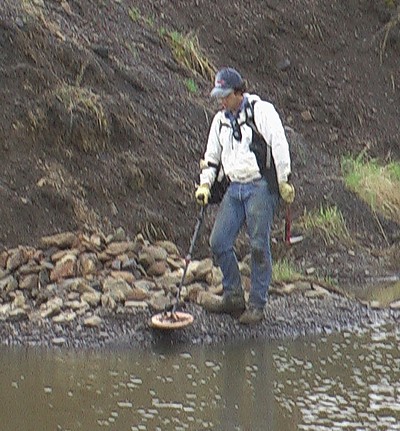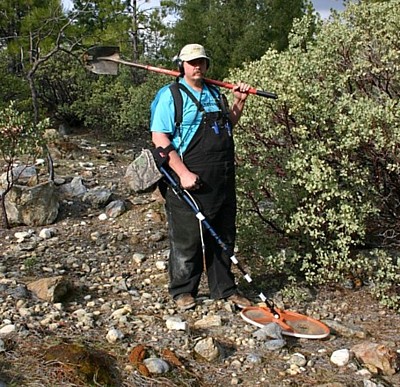Interested in using a metal detector to locate big gold? This is my page of information on how to metal detect for gold nuggets......
Metal detecting for gold is something new. The old timers, decades ago, never had any piece of equipment remotely like a metal detector. Modern technology however, has brought us a new device - the metal detector. Electronic device which can sense metallic objects buried in the ground. Since gold is certainly a metallic material, metal detectors can be used to find gold nuggets. In the last 20 years, detecting for nuggets has become a very fast-growing aspect of the prospecting world. Several companies have developed metal detectors specifically optimized to find nuggets. Mind you, there is no such thing as a metal detector which finds only gold and no other types of metal, but there are systems capable of distinguishing iron trash from gold in most cases, and technology continues to improve. Out in the western gold country, the traffic of electronic prospectors on the hills appears to be increasing at a rapid rate. While a lot of factors are contributing to this, probably the biggest force attracting these new folks is the continuing increase in the price of gold. Many experts think gold is headed higher for the long term and the number of new prospectors out in the field will surely reflect this increase in the coming years. | ||
There are many varieties of metal detectors with technologies and features designed for certain characteristics and certain types of uses. All of the technologies currently in use work by putting electrical energy into a coil which creates a magnetic field and then sensing the response of a metallic object to that magnetic field. Some are designed for hunting deep caches and treasure, others for general purpose coin and jewelry hunting, and still others for underwater or beach hunting. The type we are most interested in is those detectors designed specifically to prospect for gold nuggets. Many folks considering the purchase of a metal detector will ask “which one is best”? This is not a simple question and the answer depends on your finances and what you intend to do with your metal detector. When considering what detector to buy it is important to consider what type of detecting you want to do. If you plan to only detect for nuggets once in a while, you probably will be most interested in a general purpose detector which can also be used for detecting coins and jewelry at schools, parks and other locations. If you intend to focus only on detecting for nuggets and have the cash, it is best to purchase a detector which is optimized for nugget detecting. The depth at which a nugget can be detected varies quite a bit with size, density and shape of the nugget, the mineral content of the soil, the technology of the detector, the size of the coil being used and a number of other factors as well. |  | |
The world of metal detectors designed to detect nuggets is dominated by two technologies one is called VLF or induction balance, the other is called PI or pulse induction. With the VLF technology, the electric energy into the coil goes up and down as a sine wave. With PI technology, the electric energy into the coil turns on, shuts off for a brief period of time, then senses the presence of any metallic object. In general, VLF technology is able to sense smaller gold and to discriminate gold from most iron trash, but it is also more sensitive to negative effects from mineralization in the ground. PI technology is able to sense large gold deeper and is much less sensitive to mineralization in the ground. Intense mineralization is common in many gold mining districts. As a result, detectors using Minelab PI technology are the ones most commonly used to find gold nuggets in many parts of the Western US. Getting the best quality equipment isn’t cheap. The cost of a top of the line, brand new Minelab GPX4000 with the typical accessories and a few extra coils currently runs well over $4500, and that is no small chunk of change. Yet in spite of that fact, there seems to be an unending stream of new prospectors – often retirees – that are willing to shell out some significant money to get involved in this exciting pastime. A surprising number are completely new prospectors. These are guys who have never panned, sluiced or dry washed a single flake previously, but are attracted to the possibility that sophisticated detector technology can help them find some trophy sized gold nuggets (I can say from experience that staring too long at those trophy nuggets will give you a bad case of gold fever faster than you can imagine!). | ||
In my mind, nugget detecting is the toughest form of individual prospecting to consistently succeed at, so new electronic prospectors can really use as much additional information and training as they can get. It is certainly very possible for the average guy to be successful at nugget shooting, but it is not easy – you have to be willing to make the effort. Learning the actual techniques needed to operate your detector such as which settings to use, etc. may only take a few hours but learning to find gold is a much more difficult proposition. Consider it like a trade – it is a skill that takes time to learn – you don’t buy a wrench or a voltmeter and become a journeyman plumber or an electrician overnight. I believe it is much more difficult for novice prospector to consistently get nuggets with a metal detector than it is to consistently get a little “color” with a dry washer, sluice box or dredge. With a metal detector, it’s easy to spend a whole day looking very hard and still get skunked. It is normal that it often takes a new detector owner many months to even more than a year to find his or her first nugget – even if you are out detecting for nuggets regularly. The attraction of the metal detector is the fact that the yields can be very much higher - when you are successful, you can find a significant amount of gold very quickly. It takes time, however to learn those skills and gain the experience needed to be successful. |  | |
I do think a lot of new guys sometimes look at the forums, see other guys posting photos of gold and get the wrong idea. Too many new guys expect that somehow you can just walk out anyplace near an historical old gold district and start digging bean-sized nuggets every hour or so with the occasional walnut sized nugget thrown in for good measure. Some even figure they can make a good living or even get rich doing it. Unfortunately it's just not that easy, and the prospect for getting rich quick is extremely remote. If you are willing to spend the money to get quality equipment, to put in the time it takes to learn to operate that equipment and then do the work to research potential areas and put in the time to explore around in places where detectable nuggets are found, then you'll be able to find some gold too, but its never easy. Buying a great detector is a fine start, but owning a powerful detector no more makes one an experienced nugget shooter than owning a pipe wrench makes one a plumbing contractor. With both, there are lots of skills to learn, and it takes time to gain the needed knowledge and experience. Dogged determination is a necessary asset for the new electronic prospector! | ||
It's important to learn what you can about how gold occurs - its geology and how it forms in the districts you will be prospecting in. Each district has its own special features and geology, and what works in one location to find gold may not be a good idea in another. All this means that taking up the hobby of electronic prospecting can be very exciting and productive but it also means there's a lot of work to learn about how to use a metal detector in finding gold. There have been some really amazing finds made with metal detectors - large multi-ounce nuggets - small patches of ground with dozens of ounces of gold, quartz veins laced with gold and other spectacular finds. However there is a lot of skill and a bit of luck involved in making some of the spectacular finds. Don’t expect that somehow you can just walk out anyplace near an historical old gold district and start digging bean-sized nuggets every 15 minutes or so with the occasional walnut sized nugget thrown in for good measure. Please don't figure that you can make a load of money and get rich with a metal detector. Unfortunately it's just not that easy, and the prospect for getting rich quick is extremely remote - it is happened to a few, but there are thousands of guys armed with metal detectors in Australia and the Western US. |  | |
Get what information you can from the more experienced guys. In the end however, the most important thing is to learn to be able to explore on your own and find your own gold patches. Learn to do your own research – it’s like the old saying “give a guy a fish and you’ve fed him for a day, but teach him how to fish and you’ve fed him for life”. Read “location books” then go out in the field and explore for yourself. If you are a new prospector, I'd suggest you join a local prospecting club. They have claims you can legally prospect on that are within a reasonable drive, and it's nice to not have to worry if you're trespassing on someone else's claim. You can meet other guys in your area interested in prospecting and learn a lot from the other club members. It really is a good place to gain useful prospecting experience. Finding gold isn’t easy and the knowledge and experience you will gain are what make the difference in finding gold or getting skunked. There are always pay to detect locations like Moore Creek, Alaska or Gaines Creek, AK. There are some others as well. Even at these locations, the finds are anything but even. Some folks will do very well and others not as well - reflecting both skill levels, the amount of work put in and short-term luck. | ||
Comments: 0
Post a Comment